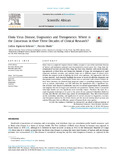Ebola Virus Disease, Diagnostics and Therapeutics: Where is the Consensus in Over Three Decades of Clinical Research?
Abstract
Ebola virus is a neglected tropical disease widely accepted as one of the most fatal diseases of human and nonhuman primates ever encountered in recent years. For a long time, development of vaccines and anti-Ebola drugs has been slow. However, with recent devastating outbreaks in West Africa and Democratic Republic of Congo, the development of rapid diagnostic methods, vaccines, and antiviral drugs are at different stages of clinical trials. Despite the progress made in fighting the Ebola virus epidemic, the approaches still face various obstacles. Such obstacles highlight the desire to search for effective diagnostic and therapeutic interventions. Furthermore, Ebola virus is associated with adverse indirect effects since resources are diverted from programs aimed at controlling important diseases such as malaria, tuberculosis, and HIV infection. We hypothesize that a significant burden of Ebola viral disease if undetected may lead to missed opportunities for prevention and heighten the risk for large-scale outbreaks and pandemics. Further, Ebola is associated with high fatality rate and significant socio-economic impact. Therefore, the need for a rapid diagnostic technique to be used at the point of care, universal Polyvalent-Ebolavirus vaccine, and effective anti-Ebola drug cannot be overemphasized. Thus, this review focuses on the availability, suitability, and significance of current advances in diagnostics, vaccines, and therapeutic options for the Ebola disease and the need to develop novel vaccines and antiviral therapies that are effective against all known Ebola virus species.
URI
https://doi.org/10.1016/j.sciaf.2021.e0086http://ir-library.mmust.ac.ke:8080/xmlui/handle/123456789/2357
Collections
- Gold Collection [1026]

